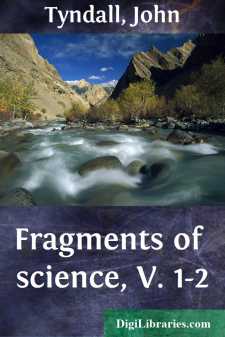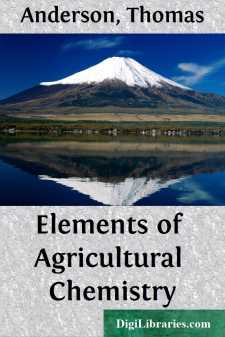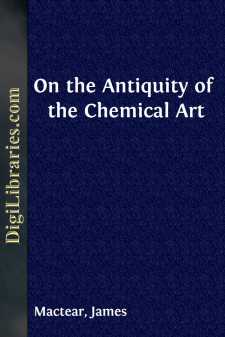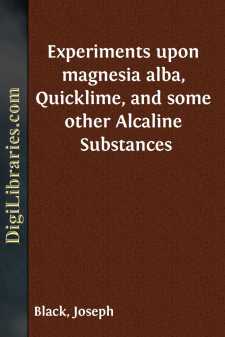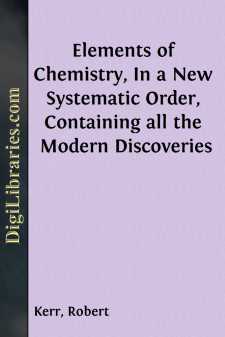Science
- Astronomy 18
- Biology 40
- Chemistry
- Electricity 1
- General 38
- History 6
- Light 1
- Paleontology 2
- Philosophy & Social Aspects 1
- Physics 3
- Relativity 2
- Study & Teaching 1
- Waves & Wave Mechanics 1
Chemistry Books
Sort by:
by:
Joseph Priestley
THE PREFACE. One reason for the present publication has been the favourable reception of those of my Observations on different kinds of air, which were published in the Philosophical Transactions for the year 1772, and the demand for them by persons who did not chuse, for the sake of those papers only, to purchase the whole volume in which they were contained. Another motive was the additions to my...
more...
by:
John Tyndall
I. THE CONSTITUTION OF NATURE. [Footnote: 'Fortnightly Review,' 1865, vol. iii. p. 129.] WE cannot think of space as finite, for wherever in imagination we erect a boundary, we are compelled to think of space as existing beyond it. Thus by the incessant dissolution of limits we arrive at a more or less adequate idea of the infinity of space. But, though compelled to think of space as...
more...
by:
Thomas Anderson
INTRODUCTION. That the phenomena of vegetation are dependent on certain chemical changes occurring in the plant, by which the various elements of its food are elaborated and converted into vegetable matter, was very early recognised by chemists; and long before the correct principles of that science were established, Van Helmont maintained that plants derived their nourishment from water, while Sir...
more...
by:
William Crookes
THE CHEMICAL HISTORY OF A CANDLE LECTURE I. A CANDLE: THE FLAME—ITS SOURCES—STRUCTURE—MOBILITY—BRIGHTNESS. I purpose, in return for the honour you do us by coming to see what are our proceedings here, to bring before you, in the course of these lectures, the Chemical History of a Candle. I have taken this subject on a former occasion; and were it left to my own will, I should prefer to repeat...
more...
by:
James Mactear
The study of the History of Chemistry as an art, or as a science, is one which possesses peculiar fascination for its votaries. It has been the subject of deep research and much discussion, much has been written upon the subject, and many theories have been broached to account for its origin. We have had laid before us by Professor Ferguson, in his papers on this subject of Chemical History, very...
more...
by:
Robert Boyle
INTRODUCTORY To the following Treatise. O give the Reader an account, Why the following Treatise is suffer’d to pass abroad so maim’d and imperfect, I must inform him that ’tis now long since, that to gratify an ingenious Gentleman, I set down some of the Reasons that kept me from fully acquiescing either in the Peripatetical, or in the Chymical Doctrine, of the Material Principles of mixt Bodies....
more...
by:
Joseph Black
Hoffman, in one of his observations, gives the history of a powder called magnesia alba, which had long been used and esteemed as a mild and tasteless purgative; but the method of preparing it was not generally known before he made it public. It was originally obtained from a liquor called the mother of nitre, which is produced in the following manner: Salt-petre is separated from the brine which first...
more...
by:
Robert Kerr
The very high character of Mr Lavoisier as a chemical philosopher, and the great revolution which, in the opinion of many excellent chemists, he has effected in the theory of chemistry, has long made it much desired to have a connected account of his discoveries, and of the new theory he has founded upon the modern experiments written by himself. This is now accomplished by the publication of his...
more...
I THREE PERIODS OF PROGRESS The story of Robinson Crusoe is an allegory of human history. Man is a castaway upon a desert planet, isolated from other inhabited worlds—if there be any such—by millions of miles of untraversable space. He is absolutely dependent upon his own exertions, for this world of his, as Wells says, has no imports except meteorites and no exports of any kind. Man has no wrecked...
more...
In venturing to offer to the public, and more particularly to the female sex, an Introduction to Chemistry, the author, herself a woman, conceives that some explanation may be required; and she feels it the more necessary to apologise for the present undertaking, as her knowledge of the subject is but recent, and as she can have no real claims to the title of chemist. On attending for the first time...
more...



